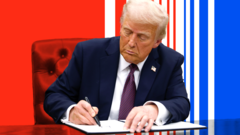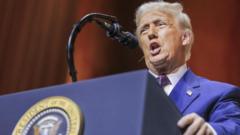The recent suspension of tariffs on low-value packages from China comes after a tumultuous order led to confusion among U.S. postal services, businesses, and consumers, raising concerns about trade dynamics in e-commerce.
Trump's Tariff Suspension on Chinese Packages Creates Uncertainty

Trump's Tariff Suspension on Chinese Packages Creates Uncertainty
U.S. President Trump has suspended recently imposed tariffs on small packages from China, impacting e-commerce operations amid changing regulations.
Trump's latest modification to tariff regulations has drawn attention, as small package shipments from China were temporarily halted following his initial directive that altered longstanding trade policies. When Trump initially announced a 10% increase in border taxes on February 4, it included an end to duty-free treatment for packages valued under $800. This change caused significant disruption, prompting an immediate response from shipping services.
In the wake of the order, the U.S. Postal Service briefly suspended accepting these small packages only to backtrack a day later, highlighting the confusion and disarray faced by agencies striving to comply. The temporary halt raised worries about whether multiple online retailers, including significant players like Shein and Temu, would still be able to operate effectively within the U.S. market.
President Trump's decision to uphold the exemption until adequate processing systems were established reflects the ongoing challenges posed by his fast-paced policy changes since taking office last month. Among these, he previously raised tariffs on goods from Canada and Mexico, only to retract those measures to enable continued negotiations.
Most notably, Trump has indicated plans for "reciprocal tariffs" on a broad range of products, aligning U.S. tariffs with those imposed by other countries. This strategy stems from sentiments expressed during his campaign regarding equitable treatment in international trade.
Historically, the U.S. had justified the $800 exemption threshold to facilitate trade and boost the economy, a policy that has come under scrutiny as online shopping exploded, leading to overwhelming increases in package volume—growing from 140 million to over 1.3 billion shipments last year.
In contrast, the Biden administration previously sought to tighten regulations on low-value packages to bolster domestic industry and combat illicit drug trafficking. The initiation of these discussions predates Trump's office, indicating a broader context in the ongoing debate surrounding tariffs and trade from China.
As the situation continues to evolve, analysts and stakeholders are closely monitoring the administration's next steps, reflecting the complex interplay between varying economic interests and regulatory oversight in international trade.
In the wake of the order, the U.S. Postal Service briefly suspended accepting these small packages only to backtrack a day later, highlighting the confusion and disarray faced by agencies striving to comply. The temporary halt raised worries about whether multiple online retailers, including significant players like Shein and Temu, would still be able to operate effectively within the U.S. market.
President Trump's decision to uphold the exemption until adequate processing systems were established reflects the ongoing challenges posed by his fast-paced policy changes since taking office last month. Among these, he previously raised tariffs on goods from Canada and Mexico, only to retract those measures to enable continued negotiations.
Most notably, Trump has indicated plans for "reciprocal tariffs" on a broad range of products, aligning U.S. tariffs with those imposed by other countries. This strategy stems from sentiments expressed during his campaign regarding equitable treatment in international trade.
Historically, the U.S. had justified the $800 exemption threshold to facilitate trade and boost the economy, a policy that has come under scrutiny as online shopping exploded, leading to overwhelming increases in package volume—growing from 140 million to over 1.3 billion shipments last year.
In contrast, the Biden administration previously sought to tighten regulations on low-value packages to bolster domestic industry and combat illicit drug trafficking. The initiation of these discussions predates Trump's office, indicating a broader context in the ongoing debate surrounding tariffs and trade from China.
As the situation continues to evolve, analysts and stakeholders are closely monitoring the administration's next steps, reflecting the complex interplay between varying economic interests and regulatory oversight in international trade.





















